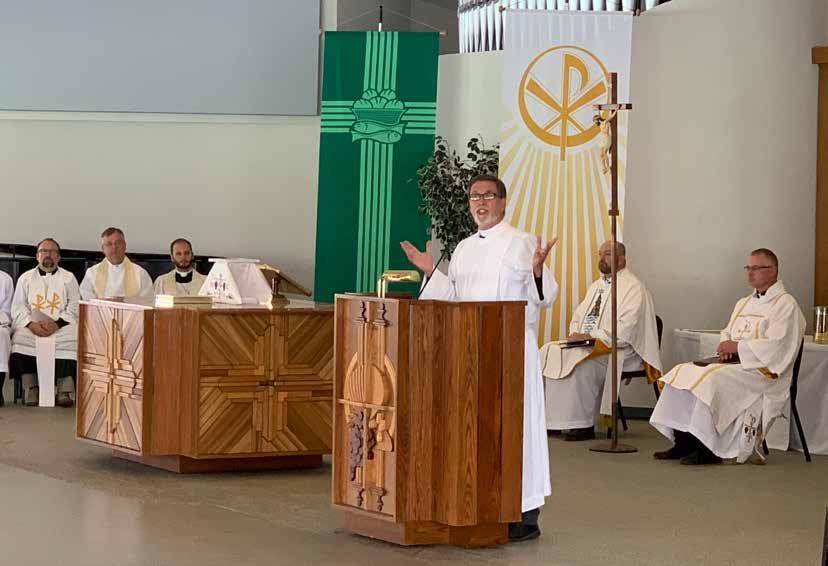
4 minute read
Liturgical Catechesis Stillness, Symbol, Sacrifice, Sacrament: Reflections on Worship
By Rev. William M. Cwirla
I was honored to serve as chaplain for the ConcordiaIrvine Higher Things conference this past summer. Presiding at a Higher Things conference is a bit like borrowing a friend’s Ferrari and taking it out for a spin on the open road. The music, the voices, the preaching, and the services remind us that worship is heaven come down to us, a foretaste of a Feast to come.
Advertisement
In addition to presiding, one of my duties as conference chaplain was to be the conference’s liturgical catechist—teaching, answering questions, and modeling the practice of worship. For a few minutes after each morning service, as the chancel was transformed into a stage and the sanctuary into an auditorium, I spoke about four aspects of worship: stillness, symbol, sacrifice, and sacrament. I think about these things as a pastor-presider, so I put a few of my thoughts here for your reflection.
Stillness
Stillness is preparation, like the earth sitting in silent darkness waiting to hear God speak His creative Word (Genesis 1:1-2). We Lutherans tend to be uncomfortable with silence. We talk before and even during worship. We gloss over the instruction that reads, “Silence for prayer may follow.” When there is a call for silence, we shuffle our feet, rustle our service folders, sneeze, cough, and whisper. Anything but silence. I’ve had worship assistants nudge me during silence, thinking I had fallen asleep or had forgotten what comes next.
At Concordia-Irvine, we practiced a little silence together. Silence takes practice; it doesn’t come to us naturally as we are accustomed to noise. Four hundred people sat up straight, breathed deeply, and prayed silently. The sound of stillness filled the air with anticipation. Before you can listen, you must be still. The noise in our ears, and in our heads, needs to be quiet. “Be still and know that I am God” (Psalm 46:10). Stillness prepares our ears, minds, and hearts to hear God’s Word.
Symbol
Symbols are decorations, like the ornaments on a Christmas tree. The ornaments don’t make the tree, but they tell you what the tree means. Symbols are words for the eyes: stained glass windows, pictures, vestments, paraments, banners, candles, vessels. A pastor or a deacon wears a stole around his neck as a symbol of Office. The chalice and the unbroken loaf of bread are symbols of our unity in the Body and the Blood of Christ. Baptizing by immersion is a symbol of the drowning of the old Adam in Holy Baptism, just as pouring is a symbol of the washing away of our sin. The gestures of kneeling and bowing, the sign of the cross, and hands extended in blessing are symbolic gestures, adorning the Word that accompanies them.

We are stewards of symbols and are to use them wisely and knowledgably. If we don’t, someone else might take them over. Think about all those people who wear a cross, or even a crucifix, as jewelry, but do not follow the One who hung on the cross for their life. In the same way we care for the American flag, a symbol of our country, so we are careful with the symbols that adorn our worship. That’s why we pulled different banners in front of the altar and pulpit during plenary sessions and moved the pulpit and altar back out of the way. We were taking care of our symbols. Sanctuaries and auditoriums are different kinds of space for different purposes.
Sacrifice
Sacrifices usually went up in literal smoke in the Old Testament. Incense is a symbol of the sacrifice of prayer, a sweet-smelling smoke rising up to the Father, carried by the fire of the Holy Spirit offered through the high priesthood of Jesus. Sacrifices are works that we do for God, our priestly service to God. Our bodies, baptized into Christ, are “living sacrifices” (Romans 12:1) offered up in priestly service, holy and acceptable on account of Christ’s sacrifice. Before God, we offer our prayer and praise, our confession and faith, our thanksgiving and obedience. Before our neighbor, we offer our bodies in sacrificial love. Even the pastor preaching in the pulpit or presiding at the altar is offering a sacrifice out of his vocation. Here’s a good rule: If we are doing or saying it, it’s a sacrifice.
Even though God works through our sacrifices, none of our sacrifices can atone for our sin. That alone belongs to the once-for-all sacrifice offered by Jesus on the altar of His Cross. Our sacrifices are all “eucharistic,” thanksgiving sacrifices offered in thanks and praise to Him who rescued us from sin and death. They are sweet-smelling incense in the nose of the Father, not because we smell so good (we don’t!), but because they are offered in faith and received through the sacrifice of Christ, our own High Priest.
Sacrament
A sacrament, as we Lutherans define it, is something God does to reveal His undeserved kindness toward us in Christ. It is God’s service to us. While the Sacraments are adorned with symbol and accompanied with sacrifice, they are entirely God’s doing through His Word. Baptism, the Body and the Blood of Jesus in His Supper, and the spoken Word of forgiveness are all God’s Word and work without so much as a twitch on our part. Here’s another good rule: If God does it to reveal our salvation in Jesus, it’s a sacrament.
In the stillness of faith, we receive God’s sacramental gifts of grace in Christ, responding with sacrifices of thanksgiving and praise, and adorning God’s gifts with symbol—a feast for ear and eye, mind and heart. God’s service to us; our service to Him— this is the gift of worship.
Rev. William M. Cwirla is the pastor of Holy Trinity Lutheran Church in Hacienda Heights, California, as well as a president emeritus of Higher Things.










